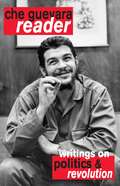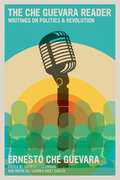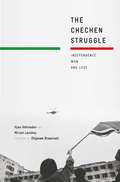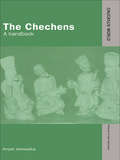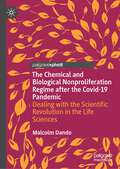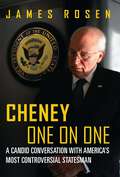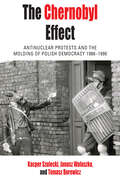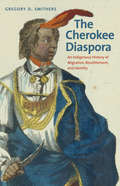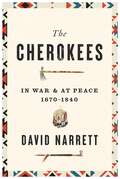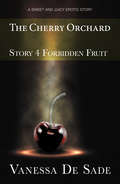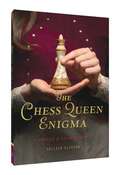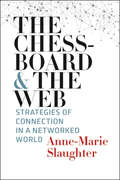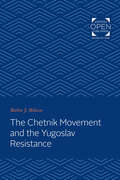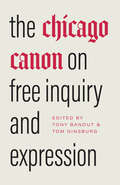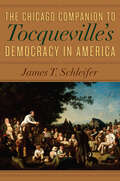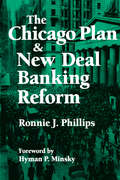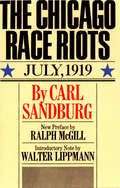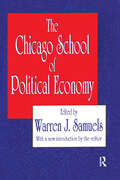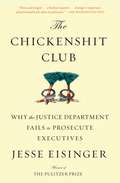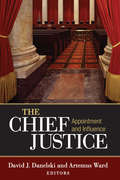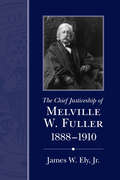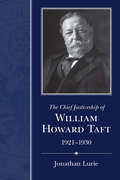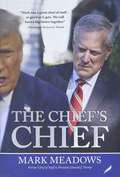- Table View
- List View
The Che Guevara Reader (Second, Expanded Edition)
by Ernesto Che Guevara David DuetschmannThe most comprehensive version of Che's writings available in English. Covering Che's writings on the Cuban revolutionary war, the first years of the revolution in Cuba and his vision for Latin America and the third world, it includes such classic essays as "Socialism and Man in Cuba" and "Two, Three, Many Vietnams". Contains several unpublished articles, essays and letters, including a letter from Che to his children shortly before his death in Bolivia in 1967 and an essay, "Strategy and Tactics for the Latin American Revolution".
The Che Guevara Reader: Writings on Politics & Revolution
by David DeutschmannSelected writings—speeches, essays, and letters—by one of the most widely known guerilla fighters, political theorists, and organizers, Che Guevara.Widely revered as a true revolutionary, this collection of writings from Ernesto Che Guevara highlight his principled politics and praxis in the fight against capitalism and US imperialism. Incisive speeches, critical essays, and personal letters not only serve as a primer of the Cuban revolutionary movement, but also analyze the importance of practicing international solidarity, reflect on violent resistance, and explicate the dangerous failures of capitalism.Accompanied by an extensive bibliography of Guevara's writing, a timeline of his life, and an all-encompassing glossary of individuals, organizations, and publications, the Che Guevara Reader provides insights into the historical, political, and cultural context for Guevara's radicalization. From some of his most famous speeches such as "Create Two, Three, Many Vietnams" to intimate, personal letters addressed to comrades around the world and his own children, this book extends Che's legacy and paints a stunning picture of a revolutionary struggling for a better world.
The Chechen Struggle
by Zbigniew BrzezinskiTold from the perspective of its former Foreign minister, this is a uniquely candid account of Chechnya's struggle for independence and its two wars against Russia which will revise our understanding of the conflict and explain how it continues. Features new insights, intimate portraits of key personalities and a foreword by Zbigniew Brzezinski.
The Chechens: A Handbook (Caucasus World: Peoples of the Caucasus)
by Amjad JaimoukhaThis book provides a ready introduction and practical guide to the Chechen people and some little-known and rarely-considered aspects of Chechen culture, including customs and traditions, folklore, arts and architecture, music, and literature. It also narrates Chechen history from ancient times and provides sketches of archaic religions and civilizations. Jaimoukha reveals the esoteric social structure and the peculiar brand of Chechen Sufism, as well as the present political situation in Chechnya.As the only comprehensive guide available in English, this book is an indispensable and accessible resource for all those with an interest in Chechnya.
The Chemical Feast: The Ralph Nader Study Group Report on Food Protection and the Food and Drug Administration
by James S. TurnerFor years the Food Group, as the food lobby is known in Washington, has nearly determined the limits of public dialogue and public policy about food quality. This report provides effective understanding of the secrecy-clouded situation.
The Chemical and Biological Nonproliferation Regime after the Covid-19 Pandemic: Dealing with the Scientific Revolution in the Life Sciences
by Malcolm DandoThis book offers an analysis of how the Chemical and Biological Weapons (CBW) regime has responded in the immediate aftermath of the Covid-19 pandemic. Coronavirus has highlighted the need to better protect modern societies from natural, accidental and deliberate disease affecting humans, animals and plants. Within that context preventing the deliberate hostile use of biological and chemical agents will be of increasing importance. Dando asks to what extent there has been a significant strengthening to the CBW non-proliferation regime in the immediate aftermath of the COVID-19 pandemic using an analysis focused on two proposals to strengthen the Chemical Weapons Convention and the Biological and Toxin Weapons Convention which aim to constrain advances in science and technology developments that could be misused. On this basis he concludes that it would be hard to argue that to date there has been a significant strengthening of the CBW regime.
The Cheney Tapes: A Candid Conversation with America's Most Controversial Statesman
by James RosenIn December 2014, a few weeks before his seventy-fourth birthday, former Vice President Dick Cheney invited Fox News reporter James Rosen into his northern Virginia home. Over three days, Rosen recorded ten hours of conversations with the man known as the "Darth Vader" of American politics. A small fraction of the interview was adapted into an April 2015 Playboy interview; but now, Rosen shares the whole, incredible conversation. With no topic off limits, the former vice president opened up about his complicated relationships with President George W. Bush and former Secretary of State Condoleezza Rice, and talks candidly about why his influence in the White House waned over Bush's second term. Rosen also presses Cheney about his WWII-era childhood, his two DUI arrests and expulsion from Yale, his political coming-of-age during the Watergate era, his reflections on 9/11 and the Iraq War, his misgivings about Syria and North Korea, his role in the development of the CIA's "enhanced interrogation techniques" and the NSA's warrantless surveillance program, and his views on life, death, and God.
The Chernobyl Effect: Antinuclear Protests and the Molding of Polish Democracy, 1986–1990 (Protest, Culture & Society #32)
by Kacper Szulecki Tomasz Borewicz Janusz WaluszkoThe 1986 Chernobyl catastrophe was not only a human and ecological disaster, but also a political-ideological one, severely discrediting Soviet governance and galvanizing dissidents in the Eastern Bloc. In the case of Poland, what began as isolated protests against the Soviet nuclear site grew to encompass domestic nuclear projects in general, and in the process spread across the country and attracted new segments of society. This innovative study, combining scholarly analysis with oral histories and other accounts from participants, traces the growth and development of the Polish anti-nuclear movement, showing how it exemplified the broader generational and cultural changes in the nation’s opposition movements during the waning days of the state socialist era.
The Cherokee Diaspora
by Gregory D. SmithersThe Cherokee are one of the largest Native American tribes in the United States, with more than three hundred thousand people across the country claiming tribal membership and nearly one million people internationally professing to have at least one Cherokee Indian ancestor. In this revealing history of Cherokee migration and resettlement, Gregory Smithers uncovers the origins of the Cherokee diaspora and explores how communities and individuals have negotiated their Cherokee identities, even when geographically removed from the Cherokee Nation headquartered in Tahlequah, Oklahoma. Beginning in the eighteenth century, the author transports the reader back in time to tell the poignant story of the Cherokee people migrating throughout North America, including their forced exile along the infamous Trail of Tears (1838-39). Smithers tells a remarkable story of courage, cultural innovation, and resilience, exploring the importance of migration and removal, land and tradition, culture and language in defining what it has meant to be Cherokee for a widely scattered people.
The Cherokees: In War and at Peace, 1670–1840
by David NarrettA sweeping new history reveals how the Cherokees became a nation as they navigated a century and a half of intertribal conflicts and colonial expansion that threatened their way of life.For more than 150 years between their first encounters with the English in the 1670s and forced removal along the Trail of Tears, the Cherokees negotiated mounting pressures. As their world was convulsed by the spread of European diseases, competition for guns, furs, and deerskins, and imperial powers’ unrelenting pursuit of “savage” allies, Cherokee communities responded by creating new solidarities. At the dawn of the eighteenth century, the idea of unity among the widely dispersed Cherokees would scarcely have occurred to their leaders. A century later, chiefs would declare unequivocally that they stood for the whole Cherokee nation.Steps toward national unity were partially a response to the exigencies of war. But while armed conflict was frequent, David Narrett shows that the bonds of Cherokee peoplehood were forged primarily through efforts to maintain peace and secure their livelihoods. The Cherokees—both men and women—were remarkably skillful diplomats who practiced peacemaking as a distinctive spiritual art in which adversaries would reconcile through a mutual and symbolic forgetting of wrongs inflicted on one another. Pragmatic and purposeful, Cherokees adeptly managed relationships with colonials and Indigenous rivals, seeking to preserve their independence and living space and to maximize advantages from trade.Rich in detail and insight, and told through captivating personal stories, The Cherokees offers a portrait of the perseverance that built a nation. Amid an onslaught of struggle and change, the Cherokees became a people who survived against all odds.
The Cherry Orchard
by Vanessa De SadeIn the searing heat of a post-apocalyptic Europe, humanity has had to readapt to survive. In this parallel world of sterile men and repressive political regimes, the tough but fragile Magda must discern whether or not true happiness can only be found in the past.
The Chess Queen Enigma (A Stoker & Holmes Novel)
by Colleen GleasonEvaline Stoker and Mina Holmes have reluctantly agreed to act as social chaperones and undercover bodyguards for Princess Lurelia of Betrovia, who has arrived in London to deliver a letter that details the secret location of an ancient chess queen that's been missing for centuries. But when the letter—which will heal a centuries-old rift between England and the Betrovians—is stolen out from under Evaline and Mina's watchful eyes, the two girls are forced into a high-stakes race to ensure they find the chess queen before anyone else does.
The Chessboard and the Web: Strategies of Connection in a Networked World
by Anne-Marie SlaughterFrom a renowned foreign-policy expert, a new paradigm for strategy in the twenty-first century In 1961, Thomas Schelling's The Strategy of Conflict used game theory to radically reenvision the U. S. -Soviet relationship and establish the basis of international relations for the rest of the Cold War. Now, Anne-Marie Slaughter--one of Foreign Policy's Top 100 Global Thinkers from 2009 to 2012, and the first woman to serve as director of the State Department Office of Policy Planning--applies network theory to develop a new set of strategies for the post-Cold War world. While chessboard-style competitive relationships still exist--U. S. -Iranian relations, for example--many other situations demand that we look not at individual entities but at their links to one another. We must learn to understand, shape, and build on those connections. Concise and accessible, based on real-world situations, on a lucid understanding of network science, and on a clear taxonomy of strategies, this will be a go-to resource for anyone looking for a new way to think about strategy in politics or business.
The Chetnik Movement and the Yugoslav Resistance
by Matteo J. MilazzoOriginally published in 1975. This book fills a gap in the historical knowledge of wartime Yugoslavia. Focusing on the Chetnik movement provides a better understanding of the various ways that important segments of the population, including members of the Yugoslav officer corps and Serb civilians, perceived and responded to the occupation. The partisans' ultimate success does not conceal the fact that during the greater part of the war, several armed groups, owing at least some sort of allegiance to Mihailovic, chose very different courses of resistance. The overriding question for Milazzo is how a movement whose leadership was in no sense pro-Axis found itself progressively drawn into a hopelessly compromising set of relationships with the occupation authorities and the Quisling regime. What was it about the situation in occupied Yugoslavia and the Serb officers' response to that state of affairs that prevented them from carrying out serious anti-Axis activity or engaging in effective collaboration? The author attends to the emergence, organization, and failure of the Chetniks, the regional particularities of the movement, and Mihailovic's efforts to establish his own authority over the widely scattered non-Communist armed formations. The author also discusses the domestic opposition to Tito and the complex reality of the national and political civil war in Yugoslavia.
The Chicago Canon on Free Inquiry and Expression
by Tom Ginsburg Tony BanoutA collection of texts that provide the foundation for the University of Chicago’s longstanding tradition of free expression, principles that are at the center of current debates within higher education and society more broadly. Free inquiry and expression are hotly contested, both on campus and in social and political life. Since its founding in the late nineteenth century, the University of Chicago has been at the forefront of conversations around free speech and academic freedom in higher education. The University’s approach to free expression grew from a sterling reputation as a research university as well as a commitment to American pragmatism and democratic progress, all of which depended on what its first president referred to as the “complete freedom of speech on all subjects.” In 2015, more than 100 years later, then University provost and president J. D. Isaacs and Robert Zimmer echoed this commitment, releasing a statement by a faculty committee led by law professor Geoffrey R. Stone that has come to be known as the Chicago Principles, now adopted or endorsed by one hundred US colleges and universities. These principles are just a part of the long-standing dialogue at the University of Chicago around freedom of expression—its meaning and limits. The Chicago Canon on Free Inquiry and Expression brings together exemplary documents – some published for the first time here – that explain and situate this ongoing conversation with an introductory essay that brings the tradition to light. Throughout waves of historical and societal challenges, this first principle of free expression has required rearticulation and new interpretations. The documents gathered here include, among others, William Rainey Harper’s “Freedom of Speech” (1900), the Kalven Committee’s report on the University’s role in political and social action (1967), and Geoffrey R. Stone’s “Free Speech on Campus: A Challenge of Our Times” (2016). Together, the writings of the canon reveal how the Chicago tradition is neither static nor stagnant, but a vibrant experiment; a lively struggle to understand, practice, and advance free inquiry and expression. At a time of nationwide campus speech debates, engaging with these texts and the questions they raise is essential to sustaining an environment of broad intellectual and ideological diversity. This book offers a blueprint for the future of higher education’s vital work and points to the civic value of free expression.
The Chicago Companion to Tocqueville's Democracy in America
by James T. SchleiferOne of the greatest books ever to be written on the United States, "Democracy in America" continues to find new readers who marvel at the lasting insights Alexis de Tocqueville had into our nation and its political culture. The work is, however, as challenging as it is important; its arguments can be complex and subtle, and its sheer length can make it difficult for any reader, especially one coming to it for the first time, to grasp Tocqueville's meaning. "The Chicago Companion to Tocqueville's "Democracy in America"" is the first book written expressly to help general readers and students alike get the most out of this seminal work. Now James T. Schleifer, an expert on Tocqueville, has provided the background and information readers need in order to understand Tocqueville's masterwork. In clear and engaging prose, Schleifer explains why "Democracy in America" is so important, how it came to be written, and how different generations of Americans have interpreted it since its publication. He also presents indispensable insight on who Tocqueville was, his trip to America, and what he meant by "equality," "democracy," and "liberty. " Drawing upon his intimate knowledge of Tocqueville's papers and manuscripts, Schleifer reveals how Tocqueville's ideas took shape and changed even in the course of writing the book. At the same time, Schleifer provides a detailed glossary of key terms and key passages, all accompanied by generous citations to the relevant pages in the University of Chicago Press Mansfield/Winthrop translation. "The ""Chicago Companion" will serve generations of readers as an essential guide to both the man and his work.
The Chicago Plan and New Deal Banking Reform
by Hyman P. Minsky Ronnie J. PhillipsThis work presents a comprehensive history and evaluation of the role of the 100 percent reserve plan in the banking legislation of the New Deal reform era from its inception in 1933 to its re-emergence in the current financial reform debate in the US.
The Chicago Race Riots: July, 1919
by Carl SandburgThis classic volume of reportage by the Pulitzer Prize–winning poet and journalist examines the racial tensions that erupted in the Red Summer of 1919.In July of 1919, a black child swam past the invisible line of segregation at one of Chicago’s public beaches. White men on the shore threw rocks at the boy until he was knocked unconscious and drowned. After police shrugged off demands for those white men to be arrested, riots broke out that would last for days, claim thirty-four lives, and burn down several houses in the city’s “black-belt.”A young reporter for the Chicago Daily News, Carl Sandburg was assigned to cover the story. His series of articles went well beyond a chronicle of the violence of the moment. They explored the complex and incendiary social, economic, and political tensions that finally ignited that summer. This volume of Sandburg’s articles includes an introduction by Walter Lipmann and a foreword by Ralph McGill.
The Chicago School of Political Economy
by Warren J. SamuelsThe Chicago School of Economics is arguably the most successful and influential since World War II. This volume provides an interpretation of the Chicago school through constructive critique of its doctrines. It is an inquiry into the nature, role, and significance of the school and its doctrines within both the economics profession and the larger world of ideas and action. This volume offers a deeper understanding of the school, of its strengths and weaknesses, and of the tasks of any body of thought that hopes to comprise an alternative.
The Chickenshit Club: Why the Justice Department Fails to Prosecute Executives
by Jesse EisingerFrom Pulitzer Prize–winning journalist Jesse Eisinger, a blistering account of corporate greed and impunity, and the reckless, often anemic response from the Department of Justice.Why were no bankers put in prison after the financial crisis of 2008? Why do CEOs seem to commit wrongdoing with impunity? The problem goes beyond banks deemed “Too Big to Fail” to almost every large corporation in America—to pharmaceutical companies and auto manufacturers and beyond. The Chickenshit Club—an inside reference to prosecutors too scared of failure and too daunted by legal impediments to do their jobs—explains why. A character-driven narrative, the book tells the story from inside the Department of Justice. The complex and richly reported story spans the last decade and a half of prosecutorial fiascos, corporate lobbying, trial losses, and culture shifts that have stripped the government of the will and ability to prosecute top corporate executives. The book begins in the 1970s, when the government pioneered the notion that top corporate executives, not just seedy crooks, could commit heinous crimes and go to prison. The book travels to trading desks on Wall Street, to corporate boardrooms and the offices of prosecutors and F.B.I agents. These revealing looks provide context for the evolution of the Justice Department’s approach to pursuing corporate criminals through the early aughts and into the Justice Department of today. Exposing one of the most important scandals of our time, The Chickenshit Club provides a clear, detailed explanation as to how our Justice Department has come to avoid, bungle, and mismanage the fight to bring these alleged criminals to justice.
The Chief Information Security Officer
by Barry L. Kouns Jake KounsDiscover the skills you need to be a successful CISO in today's changing worldThe role of the Chief Information Security Officer has evolved enormously in recent years in response to security threats and a challenging business environment. Instead of being primarily a master technician, today's CISO has to be a trusted advisor to senior management. The Changing Role of the Information Security OfficerThe CISO has overall responsibility for corporate security strategy, but today's CISO has to be in the business of managing information, not just securing it. The successful CISO needs to have excellent communication and presentation skills, and to demonstrate keen business acumen. The serious and ever-changing nature of today's security threats demand a strategic-minded response, and a successful CISO will always be thinking about how to gain business objectives through enabling technology while properly managing risk. This pocket guide emphasises the importance of a suitable information security management system (ISMS) and the risk management methodolgy that should be at its heart. Read this pocket guide and . . . Learn how the role of a CISO has changed. Today's CISO must be integrated into all aspects of the business and have a full understanding of its strategy and objectives. Understand the importance of a risk management methodology. A good risk management methodology must take into account the special information security needs of the company as well as legal and regulatory requirements. Learn how to establish a successful ISMS. The guide explains how to design and implement an ISMS that is appropriate for the organisation. It also describes the key management system processes that should be included in an ISMS. Chief Information Security Officers are bombarded with huge challenges every day, from recommending security applications to strategic thinking and business innovation. This guide describes the hard and soft skills that a successful CISO requires: not just a good knowledge of information security, but also attributes such as flexibility and communication skills.
The Chief Justice: Appointment and Influence
by Artemus Ward David J. DanelskiThe Chief Justice brings together leading scholars of the courts who employ social science theory and research to explain the role of the Chief Justice of the U.S. Supreme Court. They consider the chief justice's appointment, office, powers, and influence both within the Court and in the American system of government more generally. The chief justice presides over oral arguments and the justices' private conferences. The chief justice speaks first in those conferences, presents cases and other matters to the other justices, and assigns the Court's opinions in all cases in which the chief justice votes with the majority. In addition, the chief justice presides over the Judicial Conference of the United States, a policy-making body composed of lower-court federal judges. As Chief Justice Charles Evans Hughes wrote, the Chief Justice of the U.S. Supreme Court is "the most important judicial officer in the world."
The Chief Justiceship of Melville W. Fuller, 1888–1910 (Chief Justiceships of the United States Supreme Court)
by James W. Ely Jr.A study of the man who led the Supreme Court as the nineteenth century ended and the twentieth began, exploring issues of property, government authority, and more. In this comprehensive interpretation of the Supreme Court during the pivotal tenure of Melville W. Fuller, James W. Ely Jr., provides a judicial biography of the man who led the Court from 1888 until 1910 as well as a comprehensive and thoughtful analysis of the jurisprudence dispensed under his leadership. Highlighting Fuller&’s skills as a judicial administrator, Ely argues that a commitment to economic liberty, the security of private property, limited government, and states&’ rights guided Fuller and his colleagues in their treatment of constitutional issues. Ely directly challenges the conventional idea that the Fuller Court adopted laissez-faire principles in order to serve the needs of business. Rather, Ely presents the Supreme Court&’s efforts to safeguard economic rights not as a single-minded devotion to corporate interests but as a fulfillment of the property-conscious values that shaped the constitution-making process in 1787. The resulting study illuminates a range of related legal issues, including the Supreme Court&’s handling of race relations, criminal justice, governmental authority, and private law disputes.
The Chief Justiceship of William Howard Taft, 1921–1930 (Chief Justiceships of the United States Supreme Court)
by Jonathan LurieA study of the Supreme Court tenure of the only US president to serve as chief justice provides a unique perspective on 1920s America. In this book, Jonathan Lurie offers a comprehensive examination of the Supreme Court tenure of the only person to have held the offices of president of the United States and chief justice of the United States Supreme Court. William Howard Taft joined the Court during the Jazz Age and the era of prohibition, a period of disillusion and retreat from the idealism reflected during Woodrow Wilson&’s presidency. Lurie considers how conservative trends at this time were reflected in key decisions of Taft&’s court. Although Taft was considered an undistinguished chief executive, such a characterization cannot be applied to his tenure as chief justice. Lurie demonstrates that Taft&’s leadership on this tribunal, matched by his productive relations with Congress, in effect created the modern Supreme Court. Furthermore he draws on the unpublished letters Taft wrote to his three children, Robert, Helen, and Charles, generally once a week. His missives contain an intriguing mixture of family news, insights concerning contemporaneous political issues, and occasional commentary on his fellow justices and cases under consideration. Lurie structures his study in parallel with the eight full terms in which Taft occupied the center seat, examining key decisions while avoiding legal jargon wherever possible. The high point of Taft&’s chief justiceship was the period from 1921 to 1925. The second part of his tenure was marked by slow decline as his health worsened with each passing year. By 1930 he was forced to resign, and his death soon followed. In an epilogue Lurie explains why Taft is still regarded as an outstanding chief justice—if not a great jurist—and why this distinction is important. &“Conflicts from the early twentieth century endure, and Lurie gives us old and new perspectives from which to understand a living Constitution.&” —Journal of American History
The Chief's Chief
by Mark MeadowsWhen Mark Meadows became President Trump’s fourth chief of staff on March 6, 2020, life in the United States had never been better. Unemployment was at an all-time low, and the stock market was at an all-time high. During his first three years in office, President Trump had kept more of his campaign promises than any president in modern history, and that record of success was only going to continue. Then, in what seemed like the blink of an eye, a deadly coronavirus arrived on our shores, and brought the Trump economy screeching to a halt. <p><p>Suddenly, our streets were empty, and our hospitals were full. Millions of Americans were scared, lonely, and unemployed, all while the global economy teetered on the edge of collapse. President Trump and his team worked tirelessly to keep the country going and get a vaccine to the American people. <p><p>In this frank, candid account of his ten months in the White House, Mark Meadows—known simply as “The Chief” around the West Wing—tells the story of how he and a close team of loyal advisors helped President Trump navigate one of the worst years in American history.
